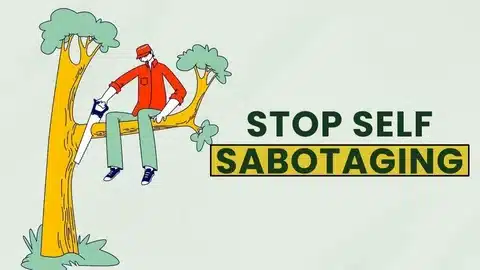Let me paint you a real picture of self-sabotage at play.
She’s been dreaming of launching her handmade skincare line for years. She’s got the formulas, the labels, and the Instagram name reserved. People compliment her products all the time, they say she should go commercial. And she agrees. She always agrees.
So one day, Ada clears her schedule and decides: this is it. She’s doing it.
But before she can register the business name, she remembers she hasn’t perfected the packaging yet. Then she starts doubting her branding skills. Then she “just needs a few weeks” to take a short marketing course. And then? Well, the momentum dies. Again.
She tells herself it’s because life got busy. But deep down, she knows it wasn’t life that stopped her. It was her. Again.
Ada is smart, capable, and deeply passionate. But she has a pattern. It’s not laziness. It’s self-sabotage. The kind that creeps in dressed as logic, perfectionism, or caution.
For starters, self-sabotage is when your actions or inactions quietly contradict the very things you say you want.
It’s the way we talk ourselves out of applying for a job we want. Or the way we delay starting a fitness routine until we “feel ready”. It can be subtle, like surfing the net instead of working on your blog, or obvious, like ghosting a person you actually like because you’re afraid it might get too real.
It’s tricky because most of the time, we don’t even realise we’re doing it. It’s not like we wake up and think, “Let me ruin my chances today.” It’s more like we just keep hesitating, second-guessing, distracting, delaying and calling it “being realistic.” But underneath all that, something else is going on.
Why We Do It
Self-sabotage doesn’t come out of nowhere. It’s not some random glitch in your motivation or a lack of willpower. Most of the time, there’s something deeper running in the background. Something emotional, old, and often unexamined. And if you don’t understand the why, you’ll keep trying to fix the behavior without ever addressing the root.
Here are some of the most common and most misunderstood reasons people sabotage themselves.
Fear of Failure/Success
For some people, self-sabotage is rooted in fear. Not just fear of failure but, weirdly, fear of success too.It sounds backwards, but success can be terrifying. Not just because of what it gives you, but because of what it might take away. With success comes visibility, pressure, and a shift in identity. If you’ve built your sense of self around being the underdog or the struggler, suddenly winning can feel disorienting.
There’s a fear that you’ll outgrow people. That expectations will rise. That you’ll lose your freedom or authenticity. So instead of risking that, you stall. You delay. You play small not because you don’t want more, but because part of you isn’t sure what that might cost.
Imposter Syndrome
This one is subtle but loud. You finally get the opportunity you wanted — the client, the promotion, the relationship — and instead of celebrating, you panic. “What if they find out I don’t actually belong here?” You start questioning your own value, picking apart your wins, over-preparing or under-delivering because deep down, you feel like a fraud.
And here’s the twist: when you don’t feel worthy of what you have, self-sabotage can feel like justice. Like you’re just balancing the scales. It’s not logical but it is familiar. And until you see it for what it is, it’ll keep robbing you of the things you’ve already earned.
Low Self-Worth or Shame
Sometimes the real block isn’t fear of failure, it’s the quiet belief that you don’t deserve better. Not because you’ve done anything wrong, but because somewhere along the line, you absorbed a message: “This is as good as it gets for someone like you.” Maybe it came from a parent, a toxic relationship, a culture that measured your worth in achievements.
Shame doesn’t always shout. Sometimes it whispers: “Don’t try too hard. Don’t dream too big. Don’t make a scene.” And that inner narrative that you’re too much, or not enough becomes the foundation of your decisions. So when something good tries to enter your life, you shut the door without even realizing it.
Childhood Conditioning or Past Failure
For others, it’s about identity. If you grew up around chaos or scarcity, peace and abundance might feel unfamiliar even uncomfortable. So when things start going well, you create friction, just to return to what feels “normal.” It sounds strange, but for a lot of us, dysfunction feels like home. If your childhood taught you that trying leads to disappointment, then giving up early feels safer. A lot of self-sabotage is actually self-protection habits we picked up when we were too young to know better.
And if you’ve failed before especially in public or painful ways, your brain might now treat ambition like a threat. You flinch before the fall even begins. You tell yourself you’re just being realistic, but really, you’re guarding old wounds that never got a chance to heal.
The Need for Control
We have the perfectionists here. The people who think, “If it can’t be excellent, it’s not worth doing.” They sit on ideas, and abandon projects entirely because they don’t want to risk being mediocre. They’d rather be seen as “potential” than “flawed.” Sometimes, it feels better to fail on your own terms than to try and fall short. If you choose to procrastinate, or not show up fully, then at least the failure was yours. Predictable. Controlled. Right?
There’s a strange comfort in saying, “I didn’t really try,” because it softens the sting of not succeeding. But control is a false safety net. What you’re really doing is pulling the plug before anyone else can — before life or people or rejection beat you to it. You’d rather burn the bridge than risk someone else deciding you’re not enough to cross it.
All of this runs beneath the surface, like a quiet operating system. And until you bring it into the light, it’ll keep undermining your confidence.
Some acts of self-sabotage are dramatic, like someone cheating just before their wedding or quitting a job mid-project. Others are boring, ordinary or sneaky.
They may look like:
- Spending 6 hours researching how to start a podcast but never recording a single episode.
- Telling yourself you’ll start that online course next Monday for the third month in a row.
- Not replying to emails from collaborators because you’re scared they’ll realise you’re not as good as they think.
- Getting close to someone, then pulling back when it starts to feel emotionally safe.
Self-sabotage isn’t a single act. It’s a pattern. A series of tiny decisions that pull you further from your goals while convincing you they’re protecting you.

The Conversation You Need to Start Having With Yourself
The first time I caught myself in a self-sabotage loop, I felt two things at once: relief and discomfort. Relief, because I could finally name that strange tension between what I said I wanted and how I kept acting. Discomfort, because once you name a pattern, you can’t unsee it, and that means you’re the one who has to do something about it.
But the truth is, you can’t break a pattern you haven’t taken the time to understand.
So, start asking questions like:
- What part of me benefits from staying stuck?
- What am I afraid will happen if I succeed?
- What would I have to give up if I actually became who I say I want to be?
The answers won’t always be pretty or logical. You might realise your procrastination isn’t just laziness; it’s a way to avoid the shame of being imperfect. Or that your indecision is protecting you from being judged. Or that some part of you, quietly, doesn’t believe you deserve more than what you have.
This isn’t about blaming yourself. It’s about understanding yourself. Because once you stop trying to “fix” yourself and start listening to yourself instead, that’s when things begin to shift. Not all at once but enough to move you forward.
So How Do You Break the Pattern?
Start small. That’s where self-sabotage usually hides — not in the big dramatic moments, but in the tiny everyday choices that quietly pull you off course.
1. Notice When It’s Happening
You don’t have to fix it right away; just catch it. That moment you say you’re going to write but suddenly remember the dishes or scroll yourself into a TikTok coma? Pause. Instead of guilt-tripping yourself, get curious. Ask, “What am I trying to avoid right now?” Sometimes the simple act of noticing pulls the plug on the cycle.
2. Acknowledge the Fear Beneath It
Instead of forcing yourself to push through the resistance, sit with the part of you that’s scared. Give it a voice. Maybe it says, “I’m afraid people will think I’m a fraud.” Okay. Now that you’ve heard it, you can respond with something kinder and more grounded: “Even if I make mistakes, I’m still allowed to try.”
Acknowledging the fear often reduces its grip.
3. Create Safety in the Process
Most people don’t actually fear the goal, they fear what it might cost to get there. Not the dream itself, but the discomfort that might come with chasing it. Things like being seen. Being judged. Having to change. So instead of forcing yourself into overwhelm, make the journey feel safer. If visibility feels too raw, start by sharing anonymously or under a pseudonym. If consistency feels like too much pressure, scale it down. Putting in ten focused minutes a day is still forward motion. You don’t need a perfect routine. You just need momentum that feels doable.
4. Watch the Self-Talk
Sabotage feeds on shame. That inner voice that says, “You always mess things up” or “You’re not disciplined enough” isn’t just mean; it’s inaccurate. So start rewriting the script, even if it feels awkward at first. Even if you don’t fully believe it yet. Tell yourself something truer, something kinder: “I’m learning.” “I can show up differently now.” The words you choose aren’t just affirmations, they’re blueprints for who you’re becoming.
5. Let Success Become Familiar
If all you’ve known is struggle, peace might feel suspicious. Progress might make you feel exposed. But this is exactly where the work is. When something good happens – a kind word, a small win, a moment of clarity – don’t brush it off. Let yourself feel it. Receive the compliment. Celebrate the step forward. Let ease exist without questioning when it will disappear.
The more you allow good things to stay, the more your mind and body will stop seeing them as threats. And the less likely you are to unconsciously push them away.
You’re Not Lazy. You’re Not Broken.
If no one’s told you this before, let me be the first: self-sabotage doesn’t mean you’re lazy or undisciplined or incapable. It means a part of you is scared. That part is trying to protect you in the only way it knows how by keeping you “safe” through stagnation.
But safety without growth becomes a prison. Once you start seeing the pattern for what it is, you’re no longer stuck inside it. You don’t need to completely overhaul your life overnight. Just start by noticing. Interrupting. Choosing again.
Progress doesn’t have to feel heroic. It just has to be real.
And the next time you catch yourself backing out of something good, take the time and ask: “What part of me is afraid right now?” Then remind yourself gently and truthfully that it’s okay to want more. And it’s okay to have it.
“There is no passion to be found in settling for a life that is less than the one you are capable of living.” – Nelson Mandela
Stay frosty.




